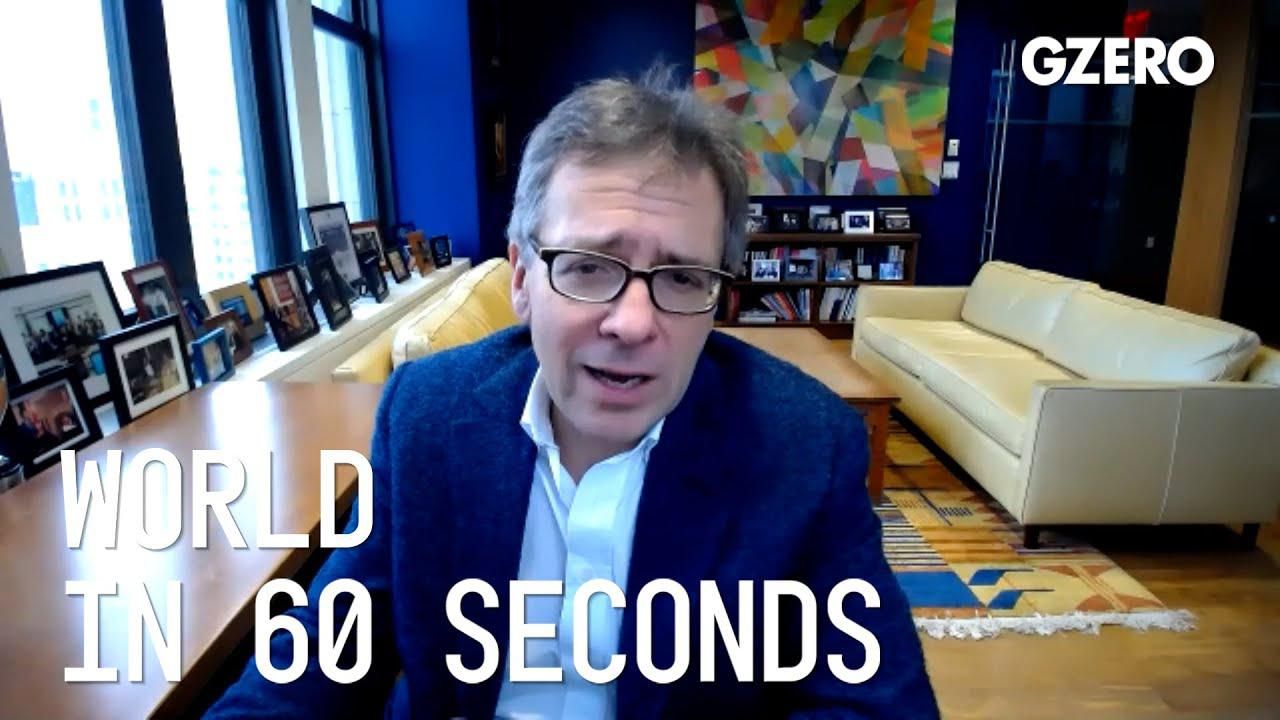
Ian Bremmer discusses the World In (more than) 60 Seconds:
First, what's the update with Alexei Navalny?
The, well-liked around the world, very popular among the West, less so in Russia, but still the closest thing you have to real opposition to Putin in the country, just got a three-and-a-half-year jail sentence. Some of that is house arrest, but most of it is actually in prison, and this is a much harder line than we've seen before with suspended sentences and house arrest, and clearly, it's because Navalny has become more of a household name and has caused more of a problem for President Putin at a time when President Putin's approval ratings are lower than they were. They're in their low 60s, which in Russia is not so great for Putin, and the economy is doing worse, and people are angrier about their pensions that aren't worth as much and wages that don't go as far, and Navalny has done everything he can, including flying back to Russia after not dying from the poisoning attempt at the hands of what almost certainly was the Russian Special Service.
So, you put all of that together, and now Navalny is a significant thorn in Putin's side and is a reason for the Americans and many Europeans to want to increase sanctions against Russia, which we will now see. They'll be primarily not against Russian sectors of the economy or key businesses. They'll be mostly against individuals, Russian elites, close to Putin, any of those seen as involved in the Navalny case, and probably some ministers and maybe some oligarchs. Which the intention would be to embarrass Putin and to undermine some of his elite level support, because that's the only way you put pressure on Putin. The mass level opposition isn't there. Let's also keep in mind the demonstrations we're seeing in Russia in support of Navalny, as dramatic as they've been, and we've had 5,000 arrests across Russia in the last week, but they're tiny compared to Belarus. They're tiny compared to the arrests for the demonstrations you saw on Khabarovsk just a year ago in Russia. So, it's not as if... as big of an issue as this is for Western headlines, the fact is that Putin is still pretty solidly entrenched in Russia itself, and his willingness to take a hard line and crack down to ensure that remains the case is pretty much complete.
Okay next. Why is the EU struggling with vaccine distribution?
Well, in part, because the EU is working together. It is coordinated, all countries are handling vaccine appropriations and distribution as one European union. In principle, that gives them a lot more market influence, but it also means it's big it's bureaucratic, and it took them a while to get behind making big orders, which meant they were behind the United States and the United Kingdom. And so now, you have the U.S. moving towards 10% of the population vaccinated, while Europe is more like two or three, and there's no question that Europeans are frustrated about that. It does mean a couple of months of greater spread in Europe, as these South African and other variants that are much more transmissible come out, while the United States in the coming months should look a lot better. Vaccine distribution you already see in Israel with over 50% of the population having been jabbed, the percentage of case spread is already going down meaningfully. That's really, really good news, and for the EU, it's going to lead to some backlash. There's no question, but overall, I think they'll get through this. The European leadership will get through this, and by the middle of the year, as they get vaccines also rolled out across the population, they will see the same level of restriction in terms of mortality and hospitalizations. The vaccines, the level of capacity of these vaccines, just a fantastic story for everyone as they get rolled out.
Is the Republican Party fracturing?
I don't think so. I mean, I see now Senate Minority leader McConnell going after Marjorie Greene, the crazy QAnon member of Congress, but remember McConnell also did that initially in terms of Trump and impeachment, and then backed away when he realized that the party wasn't with him. So, I think it's pretty clear that some of the leadership of the Republican party would prefer if they could dump the crazier, Trumpist pieces of the party, but if it turns out that the party is not there, and that the population that supports the Republican party isn't there, then they're going to back down to ensure unity of the party. And so, let's remember that whatever they ended up doing, the leadership of the Republican party is not going to risk political power. They're not going to risk their party fragmenting. They took a hit in Georgia. They lost two seats and lost control of the Senate, largely because the Trumpist wing of the party was too large, they couldn't prevent Trump from making many voters in Georgia feel like this election was rigged, so why should they turn out, and certainly Marjorie Taylor Greene has the potential to cause problems at the margins, but not to fragment the party, because the leadership won't allow that. So, the answer to is the Republican Party fracturing, in my view, is a very, very strong no.
Finally, it's Groundhog Day, six more weeks of winter, and what else?
Oh, it's got to be lockdown, six more weeks of lockdown. Why? Because it's a horrible pandemic year. And so, I think of Punxsutawney Phil sees his shadow, that means, he's stuck underground for another six months, nevermind snow.